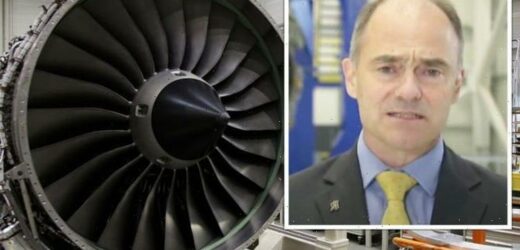Rolls-Royce Chief discusses target for Sustainable Aviation Fuel
We use your sign-up to provide content in ways you’ve consented to and to improve our understanding of you. This may include adverts from us and 3rd parties based on our understanding. You can unsubscribe at any time. More info
Warren East, chief executive of the aircraft engine maker, said that to avoid aviation becoming an even bigger share of global emissions, the sector must do more to become sustainable. Under current UN plans, at least 10 percent of fuel used in global aviation should be sustainable by 2030. But Mr East has vowed that all of Rolls-Royce’s Trent family engines, which propel many of the world’s planes, will be able to run purely on sustainable fuel by 2023.
Asked on Sky News how much more it will cost to run, he boldly responded:”It’s a question of how much it would cost us not to.
“The reality is, by 2050, we have to be net zero across the planet and aviation needs to play its part.
“We want to continue to provide engines for long-haul aviation, so that’s what we must do.”
Sustainable aviation fuel (SAF) takes many forms, but is often produced from farm crops.


It can be blended into traditional jet fuel and can create up to 75 percent less harmful CO2 fumes.
And Mr East vowed there will be “no loss” to the performance of the engines.
He added: “What we have announced today is that we are going to make sure that all our engines are compatible with sustainable aviation fuel.
“By 2050 we would expect all to be powered by that.
“There will be evolutions in the recipe of the fuel, it is possible we will get even better performance from the engines.”

Currently, the fuel can cost up to eight times more, but Mr East believes working with the like of Shell to scale up production can bring that down.
He added: “I think there are things we can do in the industry – improving the efficiency of the engines firstly.
“Then you have a massive cost reduction from scaling up the use of sustainable aviation fuel.
“We really only have less than one percent being used – by 2030 it will be 10 percent.
“That will no doubt have positive economic effects.”
DON’T MISS
Archaeology breakthrough as ‘lactose intolerant’ mummy discovered [REVEAL]
EU plots to STOP Arctic oil drilling after Putin exposed vulnerability [INSIGHT]
Covid breakthrough: ‘Highly potent’ antibody found to kill virus [REPORT]

Shell UK has vowed to increase production to two million tonnes per year by 2025 – 10 times the total produced globally today.
It has not been the easiest last 18 months for the aviation industry.
As commercial aviation collapsed last year, Rolls-Royce Holdings plunged into a near $5.5billion (£4billion) loss.
But now things are set to turn around.
According to data from Eurocontrol, the seven-day average number of UK daily flights was 3,563 in the week ending 10 October.

This is 56 percent of the level seen in the equivalent week of 2019.
Mr East says there is light at the end of the tunnel.
He added: “We are seeing a gradual return.
“Where it’s fairly easy for people to fly we are seeing an increase in demands.
“Domestic routes to China and the US the activity is back to 2019 level.
“International long-haul flights need government to government agreements.
“We were pleased to hear the US announcement of the transatlantic route opening back up.”
Source: Read Full Article

